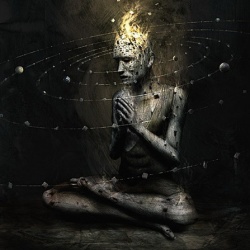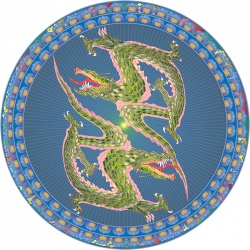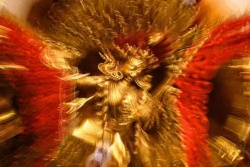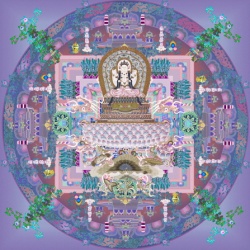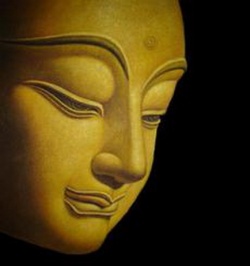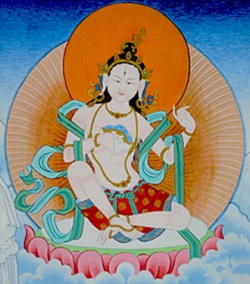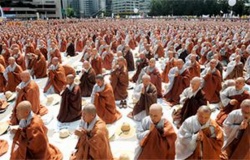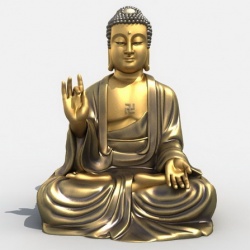Right Knowledge or Knowledge of Relations
- Q: Blessed One, tell us about the being and the non-being of all things.
A: Those who are dependent on the notion of being, regard the world as rising from a causation that is really existent, and that is the realistic view. Those who have ceased to believe in being, cherish such a foolish notion instead, heading for ruin.
Q: May we be awakened and quickly realise highest enlightenment?
A: To be taken for something or understood as anything at all, emptiness would have to have something surrounding it or within itself - or both - at least a crust, so to speak. And to experience inner emptiness there has to be someone to experience it, a core consciousness. Do not overlook the obvious any longer.
Some speak up seven kinds of emptiness. Why should they? Why bother? Low forms of so-called emptiness have individuality and generality.
Emptiness of all things - what an erroneous conception - is arrogant, preposterous – for if the premise of emptiness holds good, every saying about things is empty too, and there would be no hold of anything. If empty words and statements are taken seriously, it is due to foolish ignorance, which amounts to deep-set arrogance.
Individuality goes deep into nature. No one should meddle with it. Besides, some aspects of life are eternal. This much can be said, relatively speaking, that if things have no becoming, the world stands still, which it does not.
Those who believe in the birth of something that has never been in existence and, coming into existence, vanishes away, find no foothold in a life.
The two sets of positions on being and so-called non-being, are mutually exclusive. Yet, what is not yet, may come to pass. The full flower is not there in winter, but appears in spring from a seed in its soil,, and blossoms later. Both seeds, sprouts, flowers, fruits and seeds again manifest the whole plant through cycles of time. From a certain point in time, what follows of plant development is then of not-yet-being, that is, a facet of becoming.
My teaching transcends no-reality. Children can be shown streets and houses, then.
When objects are not seen, they may still exist. For example a blind man and a seeking man may both lie basking in the sun. The blind one does not see it, but can bathe in sunlight anyhow. It is just like that. What is more, when the blind guy dies of sunstroke, the world around him does not come to an
end. Ergo, the outer world seems real enough, and quite independent of being called a projection. This position raises a question about the worldly doctrine of no-birth – worldly because appearing in the world, that is, in this entire universe.
Chapter 4. Perfect Knowledge, or Knowledge of Reality
E (Expounding):
The five Dharmas are:
name,
right-knowledge and
By appearance is meant that which reveals itself to the senses and to the discriminating-mind and is perceived as form, sound, odour, taste, and touch.
Out of these appearances ideas are formed, such as clay, water, jar, etc., by which one says: this is such and such a thing and is no other,—this is name. When appearances are contrasted and names compared, as when we say: this is an elephant, this is a horse, a cart, a pedestrian, a man, a woman, or, this is mind and what belongs to it,—the things thus named are said to be discriminated.
Such discriminations come to be seen as mutually conditioning, as manifestations of the mind itself,—this is right-knowledge.
When appearances and names are put away and all discrimination ceases, that which remains is the true and essential What-It-Is. Not much needs to be said about the nature of essence, it is called the "Suchness" of Reality and is universal, undifferentiated, inscrutable. The only Reality is variously called Truth, Mind-essence, Transcendental Intelligence, Noble Wisdom, etc.
This teaching of the imagelessness of the Essence-nature of Ultimate Reality is the Dharma which has been proclaimed by all the Buddhas. When all things are understood in full agreement with it, one is in possession of Perfect Knowledge, and is on his way to attaining the Transcendental Intelligence of the Tathagatas.
The self-nature of Universal Mind and Reality corresponds to the Dharmas of right-knowledge and "Suchness."
What is called maya does not contain ahamkara, the ego-substance, not necessarily ignorance either.
Maya is to be developed properly too, and many deeds are fit for it.
Advance as a water-lifterer ('water' is a symbol for inner deep mind) not unlike a lamp.
It should be done from moment to moment. Quite egoless persons need to develop better maya in these respects.
There are four kinds of Knowledge:
Appearance-knowledge,
relative-knowledge, perfect-knowledge, and
1. Knowledge that pertain to appearances can be attained and accumulated by the simple too.
Assertions, discriminative activity and so on go into plots based on it.
2. Relative-knowledge belongs to thinkers. They consider relations which appearances bear to each other and to the mind considering them.
To develop this, arrange, combine and analyse notions, ideas and their relations by imagination and logic.
Through this some peer into meanings and significances attending things or phenomena.
3. Perfect-knowledge belongs to all who recognise that all perceived things are at least in part manifestations of mind; and attained to this wisdom from a basis of imagelessness (deep mind itself). Perfect-knowledge is a pathway and entrance into self-realisation of Noble Wisdom.
Perfect-knowledge (jnana) belongs to anyone who is liberated inside from non-being assertions and negations, and so on. By reason of self-realisation he or she has insight into truths of imagelessness.
The wise who cherish Perfect-knowledge, may be divided into three classes: disciples, masters and Further.
Common disciples cherish generality; masters rise from that flock when that generality-error drops off.
The wise turn into Truth by virtue of the "turning-about", also called emancipation, that takes place within the deepest consciousness.
4. Mind, thus enters into perfect self-realisation, also called Noble Wisdom.
You cannot tell a lot of truths about it, as it is beyond the world that people normally perceive and have words for.
The statement "All things are empty," is not tenable.
For in Perfect-knowledge not even emptiness is a thing to be perceived. Assertions that pertain to Pure, Deep and Universal Mind and Noble Wisdom and Ultimate Reality are not in themselves that Centre of things. Words are approximations; they are what we call It, in a nutshell.
Chapter 5. The Mind System
p E (Expounding): Discern well between subtle out-flowings of assets and keeping them intact. What serves out-flowing of the subtle, deeper assets makes barren inside. What stops or arrests it seems good in this perspective.
What is called grasping is turned outward. If mental grasping rises in the mind, mental cognition often results. Discerment makes skilled and unskilled use of cognitions. Further mental habits 'cement' some ways of thinking and discerning, and thus influence how the world, others, and oneself is perceived on some levels.
It is all related to deep out-flowings unless there is attunement with the Source inside.
The mind-system is capable of a long range of flowing sense-concepts, filtering them, discriminating and thinking on top of some of them, and passing judgement on them as to how good or bad this and that might be. The whole mind-system moves on continuously and fails to realise that its ordinary, habit-served activities are to its long-range loss unless gyrated in thoughts that serve the soul.
By normal functioning the mind-and-senses (organism) grasps appropriate elements by adhering to sensations and perceptions and administering the body through deep mind and surface parts of the mind that are under conscous control, more or less.
The "eyeness" in the eye predisposes the mind's ability to see to make a cognitive grasp and in turn become attached to multiple forms and appearances. Habits then binds some levels of mind to conform ways and others.
The subtler discriminating-mind and Universal Mind are able to see through this, and ascertain – at least in part – that the mind-body functions as a unit, not just as mutually related.
Conditioned persons may not come to hovering insights, they adhere to habits of life and perceptions and thought, and hardly follows essential reason, a product of the intellect-mind. A variety of false judgements are thus arrived at. Alas for that.
There are three divisions of its mental activity:
Mentation which functions in connection with attachment to objects and ideas;
Mentation that functions in connection with general ideas;
Mentation that examines into the validity of these general ideas.
A variety of inaccurate judgements relate to multiplicity and so on by inward and outward grasping and habit-formations that are linked to relative knowledge and the ego or soul.
Examining by intellectual acts brings conclusions as to validity, relevance, significance, and truthfulness.
Linking this way assists understanding, right-knowledge and points the way to self-realisation.
F (Further):
Five grasping aggregates are:
form,
Of these, form belongs to what is made of the so-called primary elements, whatever they may be. The four remaining aggregates merge quite imperceptibly into one another, although each is a vortex of its own.
Things are endowed with appearances of being, characteristic-marks, perceivableness, abode, work, possible causes, but the four intangible aggregates that make up personality are beyond outward-focused calculability; and they constitute what is known as mortal-mind- an outlet of Deep (Transcendental) Self, the source of Self-realisation of Noble Wisdom. A soul harbours self-interests as part of it.
Q: Universal Mind and its relation to the lower mind-system -
A: Universal Mind is thoroughly pure in its essential nature, unruffled by distinctions.
Universal Mind is like a great ocean, its surface ruffled by waves and surges, thus plays with a variety of parts goes on, though a mutual functioning that involve mind-body systems around.
[[Mind functions\\ take on individuation.
The sevenfold gradation of mind appears:
namely,
intuitive self-realisation,
thinking-desiring-discriminating,
hearing,
and all their interactions and reactions take their rise.
The discriminating-mind is the cause of the sense-minds and it defiles as it were the surface of Universal Mind.
Between Universal Mind and the individual discriminating-mind is the intuitive-mind (manas) which is dependent on Universal Mind for its cause and support and enters into relations with both.
Manas, the intuitive mind, partakes of the universality of Universal Mind, shares its purity, and is above form and momentariness like Deep Mind.
It is through the intuitive-mind that the good non out-flowings emerge and are realised (including manifested). Intuition is not momentary.
If what is called quite intuitive Enlightenment were momentary, the wise would lose their wiseness (sagacity).
Now the intuitive-mind enters into relations with the lower mind-system, shares its experiences and reflects on its activities.
Intuitive-mind is one with Universal Mind by reason of participating in Transcendental Intelligence (Arya-jnana), and is one with the mind-system by comprehending differentiated knowledge (vijnana).
Intuitive-mind has no body of its own nor any marks by which it can be differentiated. Universal Mind is its cause and support; it is evolved along with the notion of an ego and what belongs to it and that it reflects on.
Through intuitive-mind, by the faculty of intuition which is a mingling of both identity and perceiving, Deep Mind is revealed and made realisable.
The discriminating-mind is a dancer and a magician with the objective world as his stage. Intuitive-mind is the wise jester along with it.
Q: What is meant by the cessation of the mind-system?
A: The five sense-functions: the will-to-live is the mother, ignorance of inward Unity is the father.
In the end the mind gets conditioned by what takes place. Pleasure and pain are the reactions of mortal-mind as it grasps a so-called empty world – empty if ignoring the Source by infirm grasping and contacts.
As for what continues, when interactions of form, contact and grasping abate, the discriminations, graspings and attachments of the discriminating-mind are lessened too; and habitutation lessens on the surface of Universal Mind.
There is no cessation of Universal Mind in its pure and essence-nature. Universal Mind in its essence-nature stops defilements on its surface.
There is no cessation of Divine Mind which, in itself, is the abode of Reality and the Womb of Truth.
Cessation of discriminating and naming activities, which are centralised in the discriminating mortal-mind, is had by diving within.
Discriminative mind-activity abates or stops The mind-system as a whole may then succeed in dealing with or clearing away various attachments, defilements, erroneous reasonings, faults, mistakes, and unwelcome habit-formations on the face of Universal Mind.
The mind-system abates and rests well during deep meditation, and the discriminating mortal-mind ceases to operate of its own accord from time to time, and then world-perceptions (mayic) may disappear or change.
Transcending the discriminating mortal-mind is Nirvana.
Transcending the discriminating-mind can not be accomplished until there has been a "turning-about" in the deepest seat of consciousness.
It helps to form a new habit if realising Truth intuitively (by the intuitive-mind) by becoming one with Truth.
This intuitive self-realisation attained, the evolving mind-system is still set to go on.
Thus, intellectual understanding of the self and related objects pave the way for better insights:
The way is then open for an inner "turning-about" to take place. By transcending a lot of tumbling ideas one may attain a state of tranquillisation in which truths of emancipation are plain, and there will be no evil outward-flowings for as long as it lasts.
